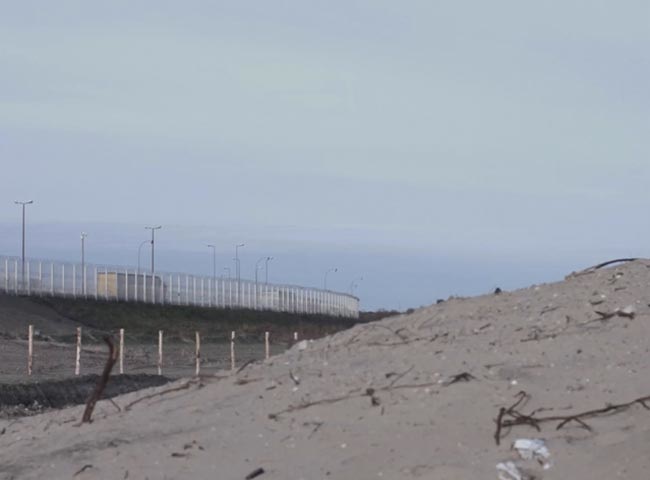Little President
-
Réalisé par Christophe Clavert • Écrit par Christophe Clavert
-
France • 2020 • 58 minutes • HD • Couleur
- Réalisation :
Christophe Clavert - Écriture :
Christophe Clavert - Image :
Christophe Clavert - Son :
Lucie Taffin - Montage :
Christophe Clavert
- Production (structure) :
MACT Productions - Ayant droit :
MACT Productions
- N° ISAN :
non renseigné
Résumé
De la résidence universitaire lilloise où il a été hébergé après le démantèlement de jungle de Calais, Khalid témoigne du parcours qui l’a mené en France, depuis le Soudan en passant par l’est européen, et de ce qu’a été, pour lui et d’autres, la Jungle.
"La Jungle de Calais, l’hypermédiatisation en a fait son miel. Loin de ce type d’échos, il s’agit pour Christophe Clavert de revenir sur les lieux, après, autrement. Cela commencera par une mise à plat de la manière. Ainsi en préambule, le rappel, scrupuleux, détaillé, des événements et du contexte politique, administratif de la jungle et de Calais en 2016, alors que se déplient en de lents plans méthodiques les lieux évoqués par le cinéaste. Intervient ensuite Khalid Mansour, unique témoin que l’on accompagnera tout au long du film. Ancien journaliste qui a fui le Soudan et qui vécut dans la jungle, son récit sera orchestré avec trois voix : celle de Marie Chebli, interprète, celle de Giorgio Passerone, intellectuel et universitaire impliqué aux côtés des migrants, puis celle de Christophe Clavert, off et après coup, commentant, complétant. On l’aura compris, il s’agit ici d’oeuvrer à l’accueil d’un témoignage, de sa singularité souveraine. Ainsi, depuis sa chambre au confort rudimentaire d’un ancien foyer pour travailleurs émigrés, il relate non sans humour ce que fut son périple et ses dangers pour lui, un Noir, à traverser l’Europe depuis l’Ukraine jusqu’à Calais. Ou se remémorant la vie d’alors, commentaire lucide, depuis les lieux de la jungle à nouveau arpentés, scrutés, aux traces désormais recouvertes, à l’histoire effacée. Et Clavert de prêter attention à la circulation de la parole, au fil de la conversation, d’offrir, point inattendu, toute sa place au travail de passage d’une langue à l’autre. Question de restitution du récit, d’un temps à l’autre, et de celle du régime des images qui se déploient, avec ces magnifiques dessins saisis alors, contrepoint aux archives photographiques et vidéo. Travail d’hospitalité, sans éclat ni spectaculaire, mais insistant sur les rémanences de l’Histoire, comme l’apostille finale le rappelle avec une saisissante âpreté."
(N.F. - FIDMarseille)
"The media hype didn’t do any good for the Calais Jungle. Far from such echoes, Christophe Clavert’s concern is to come back to the sites – afterwards, otherwise. Beginning with clarifications as to how to do things. Thus, by way of a preamble, the scrupulous and detailed reminder of events and the political, administrative context of the jungle in Calais in 2016 while the places the film-maker evokes unfold through slow, methodical sequences. Then Khalid Mansour comes in: the only witness who will be with us all through the film. Formerly a journalist who lived in the jungle and was forced to flee Sudan, his narration will be orchestrated with three voices: Marie Chebli’s, an interpreter, Giorgio Passerone’s, an intellectual and university professor committed to the migrants, then Christophe Clavert’s voice off camera, commenting and completing in the aftermath. We understand it’s about working on the reception of a testimony and its sovereign uniqueness. Thus, from an uncomfortable room in an ancient home for emigrated workers, he relates with humour what his journey was like and its dangers for him, a Black man travelling across Europe from Ukraine up to Calais. Now, through a recollection of life back then, sharp commentary, from the places in the jungle he walked through and scrutinized, to the traces all covered now, to history erased. Clavert pays attention to the circulation of speech, as conversations are pursued, so he can offer, as expected, all the space needed by the work involved in passing from one language to another. It’s about the tale’s rendition, from one time to another, and from the images of the regime unfolding, with its magnificent drawings taken back then, in counterpoint to the photographic archives and video. A work of hospitality, devoid of excessive light or spectacle, yet insisting on History’s memory, as the final annotation reminds us with striking dryness."
(N.F. - FIDMarseille)
Mot(s)-clé(s) thématique(s)
Sélections et distinctions
- 2020 • FIDMarseille - Festival International de Cinéma de Marseille • Marseille (France) • Compétition française
Comment avoir accès au film ?
-
Édition DVD
- Il n'existe pas d'édition DVD à notre connaissance
-
Accès VOD
- Il n'existe pas d'accès en VOD à notre connaissance
- Distribution
- Aide sur les moyens d'accéder à un film
